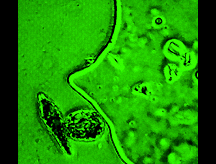

|
The course considers cells, the smallest units of life, as autonomous organisms whose function and even survival depends on behavioral strategies. We will examine how cells perceive and react to environmental stimuli such as light, gravity and electric fields. We will also probe how cells detect signals from other cells. Topics include cell-cell communication, cooperative interactions, cell migration, sexual behavior, feeding strategies, aggressive and defensive mechanisms, memory and learning and circadian rhythms. The behavior of cells will be considered in terms of molecular mechanisms, relation to embryonic development and evolutionary significance.
COURSE FORMAT: Lecture
Level: UGRD Credit: 1 Gen Ed Area Dept: NONE Grading Mode: Student Option
Prerequisites: BIOL203 OR MB&B205 OR BIOL206 Links to Web Resources For This Course.
Last Updated on MAR-26-2001
Copyright Wesleyan University, Middletown, Connecticut, 06459